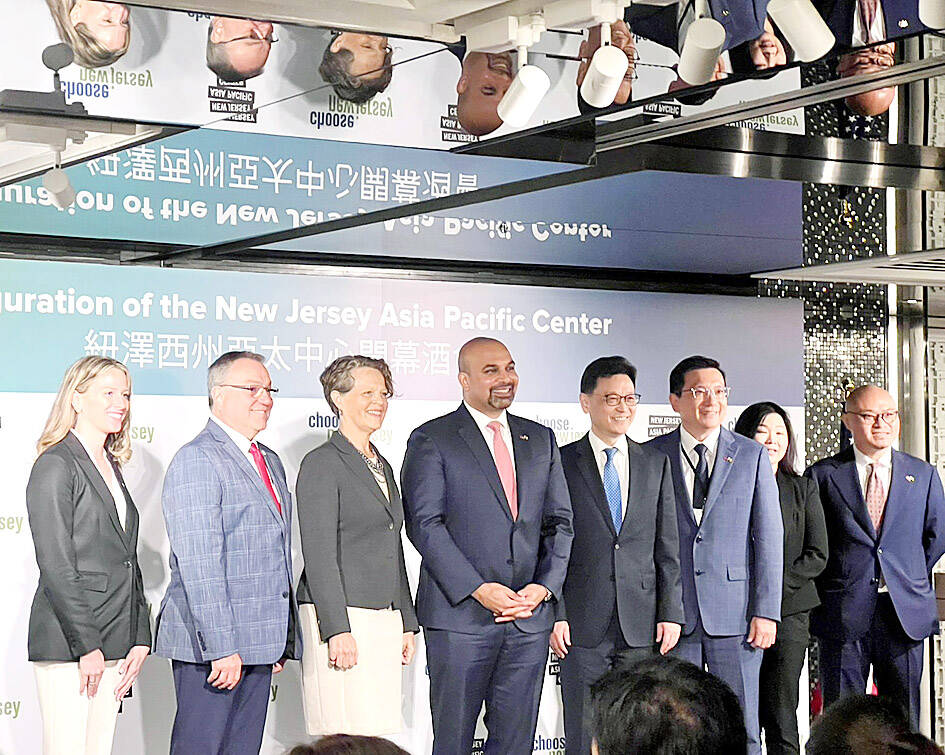The US state of New Jersey yesterday opened its Asia-Pacific center in Taiwan to expand its economic presence and cultural ties with regional partners.
In a prerecorded address played during an opening ceremony in Taipei, New Jersey Governor Phil Murphy said the New Jersey Asia Pacific Center’s opening has “unleashed new possibilities and prosperity for our workers and our families in New Jersey, in Taiwan, and across the Asia-Pacific region.”
“This pivotal step signifies the beginning of a new era, where our enduring bonds with Asian nations will evolve into unprecedented realms of opportunity, collaboration, economic prosperity and cultural enrichment,” he said.

Photo: CNA
Meanwhile, in a separate prerecorded video played at the same ceremony, Vice President Hsiao Bi-khim (蕭美琴) said that as a former resident of New Jersey, the Garden State has always had a special place in her heart.
Hsiao graduated from Montclair High School in Montclair, New Jersey.
“I am confident that the opening of the New Jersey Asia Pacific Center will provide strong momentum in boosting trade, investment and people-to-people ties between Taiwan and the Garden State,” Hsiao said. “More importantly, this will help deepen Taiwan-US economic and investment relations on the whole, making an already robust relationship even stronger.”
The New Jersey Asia Pacific Center is the fifth international office of Choose New Jersey, the state’s nonprofit business attraction organization.
New Jersey’s other international offices are in India, Israel, Germany (covering mainland Europe) and Ireland.
The New Jersey Asia Pacific Center is to serve Taiwan, Japan, South Korea and China, and is to be led by Sam Lin (林俞賢), who will manage a team of representatives, Murphy said.
More than 20 US states have now opened offices in Taiwan, the Ministry of Foreign Affairs said.

CHANGING LANDSCAPE: Many of the part-time programs for educators were no longer needed, as many teachers obtain a graduate degree before joining the workforce, experts said Taiwanese universities this year canceled 86 programs, Ministry of Education data showed, with educators attributing the closures to the nation’s low birthrate as well as shifting trends. Fifty-three of the shuttered programs were part-time postgraduate degree programs, about 62 percent of the total, the most in the past five years, the data showed. National Taiwan Normal University (NTNU) discontinued the most part-time master’s programs, at 16: chemistry, life science, earth science, physics, fine arts, music, special education, health promotion and health education, educational psychology and counseling, education, design, Chinese as a second language, library and information sciences, mechatronics engineering, history, physical education

The Chinese military has boosted its capability to fight at a high tempo using the element of surprise and new technology, the Ministry of National Defense said in the Quadrennial Defense Review (QDR) published on Monday last week. The ministry highlighted Chinese People’s Liberation Army (PLA) developments showing significant changes in Beijing’s strategy for war on Taiwan. The PLA has made significant headway in building capabilities for all-weather, multi-domain intelligence, surveillance, operational control and a joint air-sea blockade against Taiwan’s lines of communication, it said. The PLA has also improved its capabilities in direct amphibious assault operations aimed at seizing strategically important beaches,

‘MALIGN PURPOSE’: Governments around the world conduct espionage operations, but China’s is different, as its ultimate goal is annexation, a think tank head said Taiwan is facing a growing existential threat from its own people spying for China, experts said, as the government seeks to toughen measures to stop Beijing’s infiltration efforts and deter Taiwanese turncoats. While Beijing and Taipei have been spying on each other for years, experts said that espionage posed a bigger threat to Taiwan due to the risk of a Chinese attack. Taiwan’s intelligence agency said China used “diverse channels and tactics” to infiltrate the nation’s military, government agencies and pro-China organizations. The main targets were retired and active members of the military, persuaded by money, blackmail or pro-China ideology to steal

The High Prosecutors’ Office yesterday withdrew an appeal against the acquittal of a former bank manager 22 years after his death, marking Taiwan’s first instance of prosecutors rendering posthumous justice to a wrongfully convicted defendant. Chu Ching-en (諸慶恩) — formerly a manager at the Taipei branch of BNP Paribas — was in 1999 accused by Weng Mao-chung (翁茂鍾), then-president of Chia Her Industrial Co, of forging a request for a fixed deposit of US$10 million by I-Hwa Industrial Co, a subsidiary of Chia Her, which was used as collateral. Chu was ruled not guilty in the first trial, but was found guilty